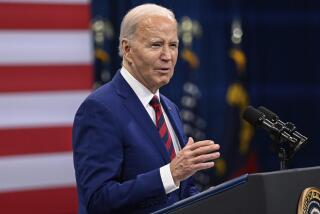Polls on budget talks show support for compromise but a strong partisan divide
Washington’s top leaders insist they want to resolve this year’s budget crisis and want the federal government to stay open after Friday’s deadline. But that doesn’t mean they can easily negotiate the political minefield to reach compromise.
Recent polls show most Americans want a compromise to avoid a government shutdown, but drilling down into the numbers shows that there are serious partisan divides that are fueling the tough stands being held by negotiators in their emergency meetings as the hours wind down to the deadline. In general, Republicans are more likely to want their leaders to push on with cuts while Democrats are more likely to favor some sort of compromise.
Though the numbers vary, recent polls by the Wall Street Journal/NBC News and Gallup show that most Americans want a compromise. Gallup found that Americans wanted a compromise by 58% to 33% with a margin of error of plus or minus 4 percentage points.
According to the WSJ/NBC poll, the universe of Republicans and independents — the crucial playing field for GOP efforts to unseat President Obama in 2012 — split almost evenly at 48% to 47% on whether compromise is better than sticking to their ideological guns. Independents overwhelmingly break for compromise by 66% to 30%. The poll has a margin of error of plus or minus 3.1 percentage points for the full sample.
But adding Democrats to the mix pushes the drive for a compromise. According to WSJ/NBC, 71% of Democrats and independents favor a compromise compared with 23% who want their leaders to stand firm. Gallup puts the numbers at 68% of those calling themselves Democrats favoring even a disagreeable compromise. Independents are at 60%.
The WSJ/NBC poll shows Republicans, especially those who favor the “tea party” movement, are more intransigent with 68% saying Republican leaders should stick to their tougher positions on budget cuts. Just 28% urged a compromise. Including less conservative Republicans, the numbers shift but a majority, at 56%, called for GOP lawmakers to stand firm while 38% want compromise.
To be sure, the internal politics of each party caucus is a major factor in how the bargaining has gone, but the caucuses in many ways reflect the overall parties’ politics. Tea party enthusiasm drove the GOP to win control of the House last November and increase the party’s standing in the Senate. House Speaker John A. Boehner (R-Ohio) has to deal with that strain which is pushing his caucus to the right.
Senate Majority Leader Harry Reid (D-Nev.) has a liberal contingent in his caucus that he must placate, but can fall back on a greater desire of his party to reach an agreement.
michael.muskal@latimes.com
Twitter.com/LATimesmuskal
More to Read
Sign up for Essential California
The most important California stories and recommendations in your inbox every morning.
You may occasionally receive promotional content from the Los Angeles Times.






